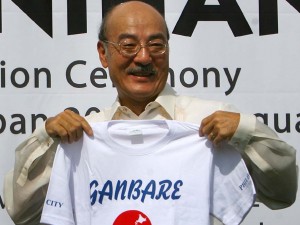Filipino nurses have stayed put in Fukushima, Japan, site of one of the worst nuclear disasters in history, to help their elderly patients.
In a speech marking the first anniversary of the Great East Japan Earthquake, Japanese Ambassador to the Philippines Toshinao Urabe on Sunday gave thanks to the Philippines and its citizens who had helped in the aftermath of the disaster.
Urabe specifically thanked the Filipino nurses who have stayed in nursing homes to help care for elderly patients, despite the threat of nuclear contamination and aftershocks.
“Just last week, I was visiting Fukushima. I wanted to pay tribute to the Filipino nurses. They stayed on despite the nuclear disaster because they couldn’t leave the helpless elderly people,” Urabe said at a ceremony on the campus of the University of the Philippines in Diliman, Quezon City.
“Don’t you worry, you’ll be safe while in Japan,” he added.
The nuclear plant in Fukushima sustained damage after the 9-magnitude quake triggered a tsunami that swamped the northeastern coast of Japan’s Honshu island. The tsunami knocked out the plant’s main power system and back-up generators that were supposed to pump water to cool its nuclear reactors.
Japan has been scrambling to cool the crippled power plant, which was rocked by explosions and fires that raised radiation levels in the coastal region and compelled the government to draw a 20-kilometer exclusion zone around the site.
Indelible mark
The Filipinos’ unforgettable support has left an indelible mark on the Japanese government, Urabe said as he thanked the Philippine government and volunteers for their help.
“Countless individuals, companies and organizations from various parts of the Philippines offered their support through our embassy, the Philippine Red Cross, and other channels,” the ambassador said.
“The Philippine government sent a medical team to Japan to provide medical assistance. President Aquino visited Ishinomaki City and offered $1 million, saying, ‘Japan has helped the Philippines so much, it is our turn to help Japan in difficult times,’” Urabe said.
Rebuilding
Although Japan faces a difficult road ahead as it rebuilds its economy, the strong will of its people and help from other nations indicate that it can recover from the disaster, the ambassador said.
“Postdisaster reconstruction, disaster-risk reduction, energy-saving and environment-friendly ‘green economy,’ aging society as an economy, will be pursued creating new opportunities. We will build a new Japan,” Urabe said.
At the ceremony attended by Speaker Feliciano Belmonte Jr., Executive Secretary Paquito Ochoa Jr. said Filipinos could not help but find inspiring the strength shown by Japan.
Ochoa also conveyed Manila’s “sincere condolences” over the destruction and death caused by the disaster.
Proverb
In a speech, Ochoa said a Japanese proverb—keizoku wa cikara nari—“captures how Japan has bounced back after this crisis.”
“Literally translated, this phrase means ‘perseverance is strength’ and this tragedy has taught us and those in the international community that the Japanese are a strong people whose capacity to persevere and triumph over adversity serves as an inspiration to us Filipinos who, like our Japanese friends, live in areas that are particularly prone to devastation from severe weather events and geological hazards,” he said.
More than 15,000 Japanese were killed in the quake, tsunami and nuclear disaster.
Pledge
“On behalf of the President, I wish Japan success as it undertakes the reconstruction and rehabilitation of affected areas. We continue to be in solidarity with Japan as it undertakes relief, reconstruction and rebuilding,” Ochoa said.
He reiterated Mr. Aquino’s “pledge” during his official visit to Japan a few months after the quake that the country was ready “to extend assistance.”
Ochoa expressed hope that the funds donated by Mr. Aquino to Ishinomaki had helped the local government and public facilities there.
Noting how both Manila and Tokyo were vulnerable to natural disasters, Ochoa thanked Japan through its overseas development assistance (ODA) which had helped the country in putting up disaster readiness and response programs.
Doppler radar
Through Japan’s ODA, the Philippines has improved its disaster prevention and response capabilities through its Doppler radar and flood warning systems, emergency shelters and river channel-improvement projects, Ochoa said.
The executive secretary said the government would inaugurate next month a new radar station in Catanduanes, courtesy of funding from the Japan International Cooperation Agency.
The radar station will “substantially improve” the accuracy of weather forecasts and will therefore, enable authorities to provide early warning to people, he said.
Ochoa expressed hope that the two countries would be able to sustain their cooperation when it came to disaster management.
Cleaner, safer
Environment groups said the disaster in Fukushima should remind governments to pursue a cleaner and safer form of energy.
Greenpeace, in a report, said Fukushima became a bigger disaster not because of the forces of nature, but because of the past and tragic predisposition of industry and government regulators to secure the interests of the nuclear industry, instead of ensuring public welfare and safety.
Greenpeace is calling for a global phaseout of nuclear power by 2035.
It warned that such a disaster could happen at any nuclear plant in the world, noting that major meltdowns had taken place every decade for the past 50 years.


